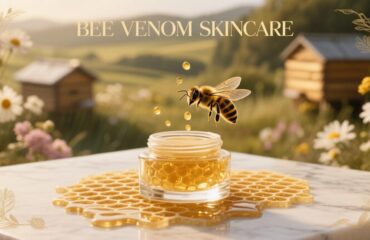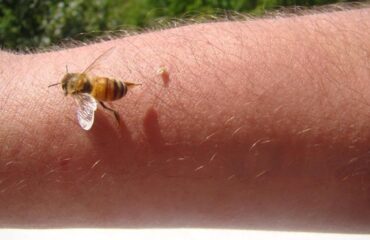Imagine the scene of a bee sting; most of us would think of pain, redness, and swelling. While the physical sting of a bee can be painful, it’s the venom that causes more severe reactions. But what if we told you that this same venom, which can cause such discomfort, also holds the key to a range of skin benefits? Bee venom, also known as apitoxin, is a colorless and odorless acidic liquid produced by worker bees to protect the hive from predators. In recent years, scientific research has revealed the potential of bee venom in treating various skin conditions and promoting a youthful complexion. This article delves into the science behind bee venom and its applications in skincare.
What is Bee Venom? Bee venom is a complex mixture of enzymes, peptides, and acids, with its main component being melittin. A single bee sting can release up to 150 micrograms of venom. Despite its potential to cause anaphylactic reactions in some individuals, bee venom has been found to contain a wealth of therapeutic properties.
Bee Venom in Apitherapy: Apitherapy, the use of bee products such as propolis, royal jelly, and venom for health and medical purposes, has been practiced for centuries. Bee venom therapy, in particular, has been used for desensitization to bee stings and for pain management. However, its application in skincare is where the real buzz is happening.
The Science Behind Bee Venom’s Skin Benefits: Research into the efficacy of bee venom in skincare is ongoing, but preliminary studies suggest that it may be beneficial in treating various skin conditions.
1. Atopic Dermatitis (Eczema): Atopic dermatitis is a common skin condition characterized by itchy, inflamed skin, and rashes. It is believed that up to 20% of children and 10% of adults worldwide may suffer from eczema. Zinc deficiency is thought to be one of the triggers, and topical application of bee venom has shown promise in managing eczema symptoms. A study involving 136 participants with eczema found that those who applied a cream containing bee venom and silk protein experienced a reduction in symptoms compared to those using a control product.
The mechanism by which bee venom may help eczema is by preventing mast cell degranulation, a process where these immune cells release histamine, a chemical responsible for allergic reactions and itching. By inhibiting this process, bee venom could potentially reduce the severity of eczema symptoms.
2. Psoriasis: Psoriasis is a chronic autoimmune disease that causes excessive skin cell production, leading to scaly, itchy patches on the skin. A double-blind, randomized clinical trial involving 50 patients with psoriasis found that 92% of those treated with bee venom experienced complete clearance of their psoriatic lesions. The study also noted a decrease in tumor necrosis factor-alpha (TNF-α) levels, a cytokine associated with inflammation and cell death. The anti-inflammatory effects of bee venom may be comparable to those of curcumin, a compound found in turmeric.
3. Acne: Acne, medically known as acne vulgaris, is a common skin condition that affects adolescents and young adults, presenting as red, inflamed pimples and pustules. While acne is generally considered to be bacterial in origin, particularly due to the presence of Cutibacterium acnes, bee venom’s antibacterial properties may offer a new approach to treatment. A double-blind, randomized controlled study observed the effects of a cosmetic product containing bee venom on acne. Participants using the bee venom product showed a reduction in both inflammatory and non-inflammatory acne lesions.
Tea tree oil, known for its antibacterial properties, was also found to reduce acne. Therefore, skincare products containing both bee venom and tea tree oil may be a potent combination against acne.
4. Anti-Aging: Maintaining youthful, smooth skin as we age can be challenging due to the loss of collagen, which leads to fine lines, wrinkles, and sagging skin. In vitro studies have shown that bee venom can help repair cell damage and promote collagen production. A clinical trial involving 22 women aged 30 to 49 who applied a bee venom cream twice daily for 12 weeks reported a reduction in the number and depth of wrinkles.
Snail secretion filtrate, or snail mucin, has also been found to reduce wrinkles and fine lines, suggesting that products combining bee venom and snail mucin may have synergistic effects in optimizing skin texture.
The Hype and Misconceptions: While the potential benefits of bee venom in skincare are promising, there are also claims that lack scientific backing. For instance, some suggest that bee venom may aid in detoxifying the lymphatic system and even assist with weight loss. The lymphatic system is a complex network that helps transport lymph fluid from tissues back into the bloodstream. While increasing water intake, abdominal breathing, exercise, and massage are known to aid lymphatic drainage, there is no research to support the claim that bee venom can detoxify the lymphatic system. Similarly, claims of bee venom as a weight loss aid are not supported by medical research.
How to Use Bee Venom in Skincare: The application of bee venom has come a long way from the painful sting. Today, bee venom creams, serums, and gels are available to help maintain skin health. High-quality bee venom skincare products often contain synergistic ingredients such as snail mucin, tea tree oil, and collagen, which together may promote and maintain skin health and radiance.
It’s important to note that while injections of bee venom can cause side effects, topical application of this potent toxin may not lead to adverse reactions. The main side effects of using insect toxins may include mild itching, pain, and swelling. Individuals allergic to bee venom should consult a healthcare professional before using such products.
Conclusion: Bee venom is a powerful natural toxin that not only protects bees but also holds the key to treating various skin conditions and maintaining a youthful appearance. Incorporating high-quality bee venom skincare products into a comprehensive skincare regimen, along with healthy lifestyle habits, can help keep your skin soft, healthy, and radiant for years to come.
Disclaimer: While bee venom has shown potential benefits in skincare, it’s crucial to approach these findings with caution. Always perform a patch test before using new products containing bee venom and consult with a dermatologist or healthcare provider for personalized advice.



